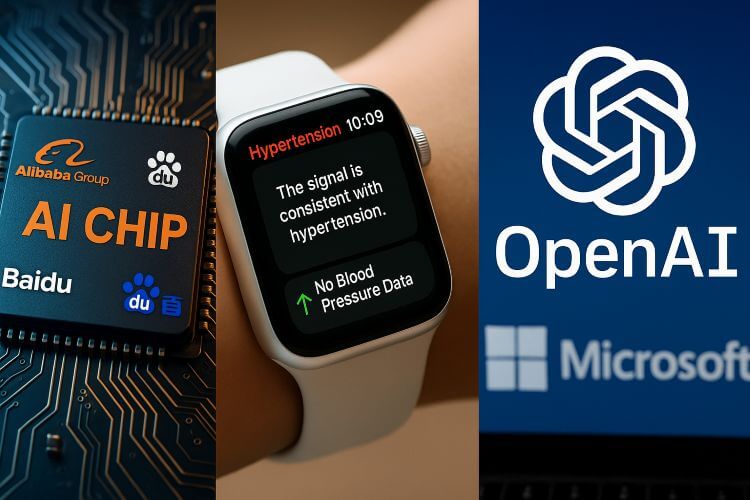AI Navigation
- articleAI Trends
- lightbulb_2AI Tips
- assistant_navigationAI Navigation
- heatHot Articles
- emergency_heat_2Hot Tips
- format_list_numberedPrompt Formatter
- psychologyTest Center(RPI)
September 12, 2025 · 24-Hour AI Briefing: Alibaba & Baidu Push Self-Developed Chips, Apple Watch Gains FDA Approval, OpenAI Restructuring Moves Forward
In the past 24 hours, the AI world has once again delivered plenty of headlines. Chinese tech giants are accelerating efforts in chip self-sufficiency, Apple Watch takes a major step into medical-grade health monitoring, and OpenAI’s restructuring clears a key hurdle with Microsoft’s support. Here are the top three developments and our in-depth commentary.

1. Alibaba and Baidu Accelerate Use of Self-Developed Chips for AI Models
Insiders revealed that Alibaba and Baidu have started using internally designed chips to train their AI models, reducing reliance on Nvidia hardware. Since early this year, Alibaba has already applied its in-house chips for lightweight AI model training, while Baidu is testing Kunlunxin’s P800 chip for training the next version of its Ernie model.
Commentary: The adoption of self-developed chips by Alibaba and Baidu marks a significant step toward technological autonomy for China’s tech industry. Although currently only a partial replacement and still behind Nvidia in high-end performance, reducing dependence on a single foreign supplier mitigates the risk of chokepoints. This aligns with the broader national strategy of strengthening self-reliance in critical technologies.
2. Apple Watch Hypertension Detection Wins FDA Approval
Apple announced that its new hypertension detection feature has been approved by the U.S. FDA and will roll out next week across 150 countries and regions. The feature leverages data from the optical heart rate sensor to analyze vascular responses to heartbeat signals. It will be available on Apple Watch Series 9, 10, 11, Ultra 2, and Ultra 3, built on advanced machine learning models trained with data from more than 100,000 participants.
Commentary: FDA approval signifies that the feature’s accuracy and reliability have reached medical-grade standards. This not only boosts user trust but also strengthens Apple’s position in the healthcare domain. Covering multiple watch models demonstrates Apple’s strong product compatibility. Following ECG, irregular rhythm notifications, and blood oxygen monitoring, hypertension detection is yet another milestone for Apple Watch. Bold prediction: could diabetes monitoring and sleep apnea detection be next?
3. OpenAI and Microsoft Revise Partnership, Paving Way for Restructuring
OpenAI and Microsoft announced a preliminary agreement that clears a critical obstacle to OpenAI’s restructuring into a traditional for-profit company. Under the new structure, OpenAI’s nonprofit entity will continue to control a new public-benefit company while holding over $100 billion in equity—around 20% of the company’s targeted $500 billion valuation.
Commentary: Founded as a nonprofit, OpenAI emphasized the mission of advancing AI research for the public good. The shift toward a for-profit structure reflects mounting commercial pressures and funding needs. Microsoft, as a core partner and investor, played a pivotal role in facilitating the restructuring. Still, balancing shareholder returns with the original mission will remain OpenAI’s defining challenge.
For more cutting-edge AI news, business insights, and tech trends, keep following:
Visit iaiseek.com
Want to catch up on other major AI events from the past 72 hours? Read here:
September 11, 2025 · 24-Hour AI Briefing: Adobe Unveils AI Agents, Oracle Soars 36%, Alibaba Challenges Meituan